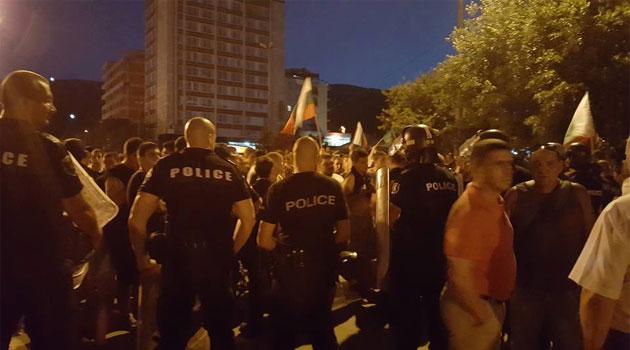Emiliya Dancheva: Can we trust the European Parliament if its members are deaf and blind to anti-Gypsyism in Bulgaria?

The political climate in Bulgaria
One year ago, the leader of the Citizens for European Development of Bulgaria (GERB) party, Mr Boyko Borissov, became Prime Minister of Bulgaria for the third time since 2009, forming an unprecedented ruling coalition with nationalistic and xenophobic parties (VMRO, ATAKA and NFSB). When Borissov named his new Government on 4 May 2017, I was shocked, just like many others, to see blatantly racist politicians raised to the ranks of Deputy Prime Ministers, Ministers and Regional Governors. I remember the comment of the famous Bulgarian political scientist Evgenii Dainov on this occasion:
“The Government is catastrophic because it is authentically anti-democratic. Most of the ministers sincerely believe in the ideology of inequality, i.e., that the stronger one has the right to harass the weaker one… A bacchanalia of lawlessness is coming; there is no place for illusions here.”
However, over the last year, I have not heard a single critical remark from the European institutions about the anti-democratic character of the Bulgarian Government. On the contrary, at the opening ceremony of the Bulgarian Presidency of the Council of the EU on 11 January this year, Mr. Jean-Claude Juncker publicly said:
“I can think of nobody better than my friend Boyko to carry Europe forward and act as a bridge-builder in our Union and beyond. I know he will do this with force; he is doing everything with force – сила – because he is a strong and committed European.”
It seems that right-wing politicians who until recently played a marginal role in Bulgarian politics are now empowered by the “Pro-European” government of Borissov and his “friends” in Brussels. This can be seen even in the European Parliament, where a petition signed by 1 300 citizens against the far right Bulgarian MEP Angel Dzhambazki was rejected by the Committee on Petitions as inadmissible – more on this below.
The petition against Angel Dzhambazki
Angel Dzhambazki is a Deputy Chair of the IMRO-Bulgarian National Movement (VMRO-BND) political party, described as a “fascist” organization in a report by the Council of Europe body, the European Commission against Racism and Intolerance (ECRI). Ironically, Dzhambazki has never been elected to public office from the ticket of his own party because it has a very small electorate. Even in the elections for the European Parliament in 2014 he ran as a candidate of another party called “Bulgaria without Censorship”.
Upon entering the European Parliament, MEP Dzhambazki felt encouraged to attack Romani people more fiercely than he had ever done before. When VMRO was invited to enter the Bulgarian Government as part of the “United Patriots” coalition in May 2017, Dzhambazki saw that as a green light as well. Being absolutely confident in his impunity, MEP Dzhambazki began speaking through Bulgarian media and social networks about waging a “war on Gypsies” and about their “euthanasia”.
The media comfort enjoyed by Dzhambazki, the silence of the Bulgarian NGO response to him, and the growing anti-Roma sentiment in Bulgaria provoked a group of Bulgarian Roma to launch a petition to the European Parliament over Facebook. The “STOP DZHAMBAZKI” petition was submitted to the Committee on Petitions at the European Parliament on 12 July 2017. The petition asked for sanctions against Dzhambazki in accordance with the internal rules of the Parliament and its own resolution on Anti-Gypsyism adopted in 2015. The collecting of signatures continued till September 2017, after which it was sent to Antonio Tajani, President of the European Parliament.
Many Members of the European Parliament from different groups were addressed by the petition. Among them was the MEP from Sweden, Soraya Post, who is of Romani descent. She is Co-President of the European Parliament’s Anti-Racism and Diversity Intergroup (ARDI), a Parliamentary body specially created to deal with similar issues. Unfortunately, MEP Post did not respond to any of the emails sent to her about the petition. She was then personally approached twice about this problem by Romani people during two hearings on anti-Gypsyism in Brussels (by Orhan Tahir on 18 October 2017 and by Michael Daduc on 10 April 2018). Her response was that the President of the EU Parliament has been contacted on similar occasions but is unwilling to undertake anything. She did not, however, explain her own unwillingness to deal with the petition.
Likewise, neither of the other two Romani MEPs, Livia Jaroka and Damian Draghici, has ever bothered to raise their voices in support of the petition. The signatures of more than 1 000 citizens from different countries did not mean anything to these people, who claim to represent us, the Roma, in the EU Parliament. We reached out to them again by email while drafting this article and they have yet to respond.
From the European Parliament to the European Ombudsman
On 28 November 2017, five months after the submission of the petition, a decision was finally reached: The petition was declared inadmissible. The Committee decided that the actions of Dzhambazki do not concern the European Parliament since the “Members of the European Parliament exercise their mandate freely and independently”. Thus, the colleagues of Mr. Dhzambazki in Brussels washed their hands of this issue by simply saying that the subject matter of the petition falls outside the competence of the EU. Unlike the Committee, the President of the European Parliament, Antonio Tajani, did not even reply to the petition, although he bears responsibility for imposing sanctions on MEPs when they breach the rules.
Despite these disappointing results, the Roma who initiated the petition did not give up. On 29 December 2017 a complaint concerning the decision of the Committee on Petitions and the lack of response from Mr. Tajani was sent to the European Ombudsman. On 16 February 2018 the European Ombudsman replied to the complaint and confirmed the decision of the Committee on Petitions using the same argumentation: “…the fact that statements are made by an MEP does not automatically bring those statements within the scope of the activities of the Union.”
The European Ombudsman, at least, has agreed that the President of the European Parliament should have answered the petition. For this reason, the office of the Ombudsman has requested an official reply from Mr. Tajani. We were told on 25 April 2018 that the EP President has drafted a reply, but that his reply needs to be analyzed by the team of the European Ombudsman. Only then will we be able to learn from the European Ombudsman what the EP President’s response to the petition is. Obviously Mr Tajani does not find it necessary to reply directly to the petitioners; rather, he prefers to communicate through the Ombudsman (and they call this “Europe of the citizens”!) . Let’s hope that reply happens within our lifetimes.
Ten months has passed since the launch of the “STOP DZHAMBAZKI” petition. The European Parliament and the European Ombudsman tell us that such anti-Roma racism is not an issue for the European Union – but who should be addressed with this issue if not the bodies of the European Union? It is the European Union, after all, that pays the salary of Bulgarian MEP Dzhambazki in Brussels, the same Dzhambazki whose statements violate all the adopted resolutions, charters and strategies on Roma in the EU, including those referring to hate speech. All of these documents are produced by the European Union. Does it mean the authors of these papers neglect their own work? Does it mean they do not guarantee the security and dignity of all EU citizens, regardless of their origin? Is the protection of one Member of the European Parliament more important than the protection of millions of European citizens?
It is doubtful whether we will receive answers to these questions, but one thing should be clear to everyone: This is the end of our illusions! The politicians in Brussels betray the trust of European citizens. We need security and respect for our human rights from them if we are expected to fulfill our obligations to them in return. If the European institutions do not abide by their own rules, then, we, the European citizens, do not need those rules either.
Emiliya Dancheva is a Romani journalist from Bulgaria and a member of the STOP DZHAMBAZKI Committee.
